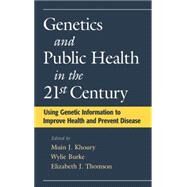Genetics and Public Health in the 21st Century Using Genetic Information to Improve Health and Prevent Disease
, by Khoury, Muin J.; Burke, Wylie; Thomson, Elizabeth J.- ISBN: 9780195128307 | 0195128303
- Cover: Hardcover
- Copyright: 8/3/2000
With the accelerating discovery of human genes, public health professionals are increasingly confronted with a large body of scientific information that will guide public health action. Because the broad mission of public health is to fulfill society's interest in assuring conditions in whichpeople can be healthy, the integration of new genetic information in public health research, policy, and program development is unavoidable. Public health leadership is urgently needed to use genetic information to improve health and prevent disease, and to address ethical, legal and social issuesresulting from inappropriate use of such information. In the not too-distant future, disease prevention and health promotion programs will routinely consider whether or not to use genetic information to help target behavioral, medical or environmental intervention activities in order to maximizebenefit and minimize costs and harm to individuals. In anticipation of the expected growth at the interface of genetics and public health, this book delineates a framework for the integration of advances in human genetics into public health practice. It provides a comprehensive review of publichealth genetics, including chapters on important general issues such as newborn and other genetic screening, the delivery of genetic services, and the ethical, legal and social implications of the use of genetics within public health. It also reviews relevant clinical topics, the historicalbackground, cross-cultural aspects, and communication issues. Contributors come from a wide range of fields including epidemiology, biostatistics, health policy and management, health services research, behavioral and social sciences, ethics, law, health economics, and laboratory sciences.






